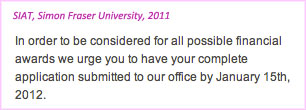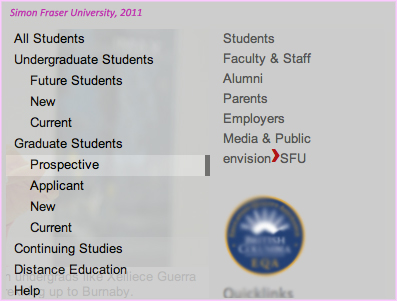...or I wanna go abroad for graduate studies... When, where and how?
Before you read this post.
This is a huge topic, and books should be published, not blog posts. If you who wish to go abroad for graduate studies, you have several options I know:
- Get one of the well known in your location/area scholarships that will financially support your studies and help with the applications. These scholarships are usually goverment funded and have some conditions (e.g. you are required to return back to your home country and work there for certain period of time.) Example: Fullbright scholarship
- Get guidance from one of the "third-party" institutions whose business is to help with this process. Of couse, it is not a cheap option, but it works for some people.
- Do everything yourself. Surprisingly many students don't even know that this is possible. Myself and many more people I know are solid facts that it is. This post is based on my experience of applying for Graduate Studies to North America and Europe (some general ideas maybe applicable to other parts of the World as well). Good luck!
When is a right time to start?
This is very important! Deadlines of all of your documents to be at the desired university are usually around December - February. The deadline maybe even earlier for International Students and for Financial Aid applications. Thus, the best practice is to start preparing a year ahead. I started in Summer 2008 (applying for Fall 2009).
In general, aim to send all required documents via traditional mail in early December latest.


Where and how?
If you are reading this post, good news - you are on the right path. Here are some tips:
- Google is your best friend. Research is your best solution:
- Google for universities and departments you want to consider. If you don't know what kind of them do exist out there, think of your criteria - any particular location? specific academic field (ex: informatics, neuroscience, HCI...)? or maybe one of the "top" universities? I was not sure what school to continue with, because my undergraduate field was very unique. Thus, I've been "Googling" stuff like: "Graduate studies, informatics, design..." and landed on a website of the Masters program I'm currently in. :)
- Once you are on a university website, search for a link for graduate admissions, it may be called "Prospective Students". All well established programs usually have an up to date information online.
- Shortlist the universities/departments you choose and take all important notes for each: deadlines, TOEFL (and sometimes GRE) score requirements and codes (in order to be able to send the results), eligibility, required documents and financial aid opportunities. One thing I've never checked was - tuition fee. It was absolutely clear for me that it is impossible to pay for my tuition myself, so I was looking for all possible internal and external scholarships/bursaries/awards as well as teaching and research options.
- Applications - most of the programs have mixed type of applications: fill forms and submit some documents online + send hard copies via normal mail. Allow enough time for your mail to reach the institutions before the deadlines. There is usually an application fee of $50-120 that you need to pay online.
- Think about what you want to do in your graduate studies, what kind of projects do you want to work on. If your program is research-based, check professors who supervise students in your desired department. Come up with a good question and contact them. Even if you don't have a "good question", contact them: shortly introduce yourself, explain why are you interested in the program and ask if they are planning on supervising new students. The best thing is to make them remember you that way and it can assist your application. I did not find my current supervisor that way, but many of the profs did answer me and it was very useful. Don't worry if they don't answer - university professors are usually very very busy and sadly your email may end up in a spam folder.


- Tests:
- TOEFL - schedule a test day in advance for around late September / early October. Internet Based option is the most convenient nowadays. Allow yourself enough time to prepare AND decide on the institutions you are going to send your scores to. You can choose up to five destinations for free BEFORE the test day. Visit local libraries for books/CDs to help you prepare. EnglishTips.org was a great resource for me for free books, sample tests and audio books.
- GRE - Depending on the program/department you choose, GRE may or may not be required. If it is required, same goes here. Mid October worked for me. It was much harder, so I've allocated more time to prepare. However, do not panic - most universities do not have cut-offs for GRE scores and they do understand that English score of international students is usually very low (because the target group are native speakers). You learn your Math score right after the test and have to decide if you want to send them to any four institutions at that moment for free.
- Financial Aid - some scholarships may require you to send TOEFL and/or GRE results as well. Actively search (online and in real life) for any scholarship opportunities that maybe applicable to you. You will not believe me, but there are many and many financial aid opportunities out there. All you need is to look for them, apply, apply and never get discouraged. I won an external scholarship (YES - Youth Education Scheme) that covered my tuition fee for the past two years. Teaching/Research assistantships are other good ways to support your education and at the same time get some valuable experience. A temporary support can be other "on-campus" and even "off-campus" part time positions. Make sure that you have all required documents to be able to work off-campus if you are planning to.
- Some documents that you will need to submit:
- Statement of purpose and Resume: Check with your university - there is usually something like "academic writing center" available to help you for free. There are plenty of examples online as well.
- Two-three letters of references: Ask your profs in advance (give them enough time, they are very busy), leave an envelope with a destination pre-written by you.
- Transcript (grades report from school). If you have to submit a hard copy, request for an official one from your school in advance. It is usually NOT free and takes some time to prepare.
- Some programs may require portfolio (examples of your work) as well. You better prepare a really good one.
- Extra - Make yourself "googlable" - create your online identity. A simple website, a LinkedIn profile or a contact page (like about.me) will support your application better than a "casual" Facebook profile. At the time I've been applying I had a crappy flash based website which was obviously (and fortunatelly) not enough for a design school.
Note
This is a first iteration of my post on this topic. Hope you found it useful and any suggestion/advices/corrections and comments are welcome. Let me know if you have any questions or need more information about any particular issue. I am always happy to help!
Many thanks to my good friend Aisulu Usubalieva who helped me with my applications when I was going through this process. I know how it feels. Good luck!
Comments